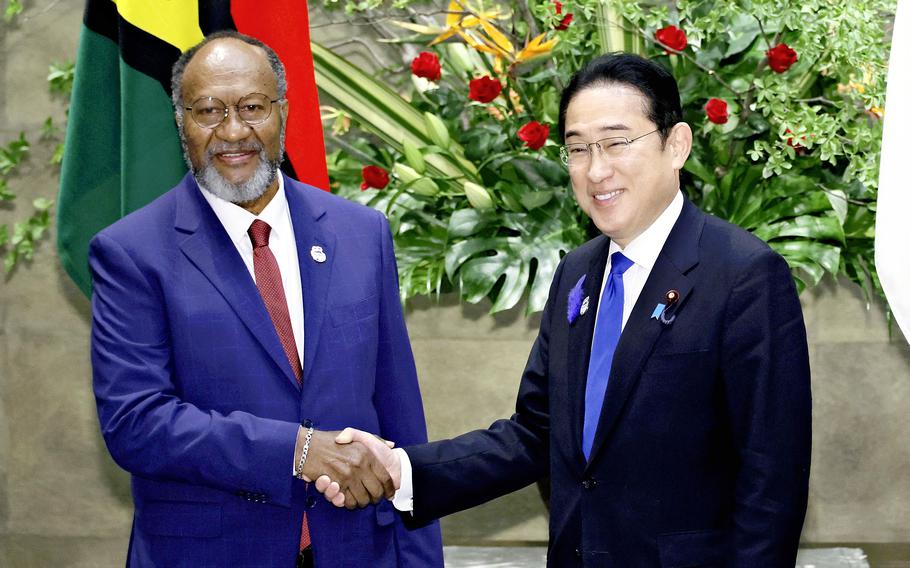
Vanuatu Prime Minister Charlot Salwai and Japanese Prime Minister Fumio Kishida shake hands with at the prime minister’s Office in Tokyo on Tuesday. (The Japan News)
TOKYO — On the first day of the Pacific Islands Leaders Meeting, which opened in Tokyo on Tuesday, Prime Minister Fumio Kishida held separate meetings with the leaders of four Pacific island countries and announced Japan’s support measures based on the needs of each country one after another.
The PALM, held at the initiative of Japan, has become part of Japan’s bid to compete against China for influence with the island nations, but the Japanese government is trying to draw attention to its stance of standing by the island nations in a way that does not unduly stir up confrontation with China.
Kishida met with Vanuatu Prime Minister Charlot Salwai on Tuesday and expressed his hope for stronger ties with the island countries. “I would like to take this opportunity to further strengthen the ties between Japan and the island nations, and to communicate to people in Japan and abroad the direction in which we are moving forward together,” Kishida said during the meeting with Salwai.
On the same day, Kishida also met with the leaders of Tuvalu, Niue and Papua New Guinea, and informed them of Japan’s plans for free provision of fisheries research vessels and disaster prevention equipment, among other items. In recent years, South Pacific island nations have been the focus of a tug-of-war between China on one side and countries including Japan, the United States and Australia on the other.
The Japanese government was keenly aware of China in holding the PALM. The government aimed for a greater number of heads of government in attendance than at a similar conference held by China in 2018, and it secured the attendance of 14 of the 16 participating island nations and regions. Kishida plans to hold separate meetings with all the heads of government in attendance.
On the other hand, some of the island countries are economically dependent on China. Prior to the PALM, Salwai and Solomon Islands Prime Minister Jeremiah Manele visited China on Friday and met with Chinese President Xi Jinping.
A senior official of Japan’s Foreign Ministry said, “It is likely that [they] struck a balance in order to attend the Japanese conference.”
Japan aims to use the PALM to curb the island nations’ dependence on China and to share with them the importance of an international order based on free and fair rules.
However, there is also a tendency on the part of the island nations to avoid getting involved in confrontations between major powers.
The leaders’ declaration to be adopted on Thursday is expected to include opposition to “attempts to unilaterally change the status quo by force” with China in mind, while avoiding directly mentioning that country by name. The Japanese government intends to distinguish itself from China by offering support that takes advantage of Japan’s technological capabilities, such as the improvement of cyber defense systems.